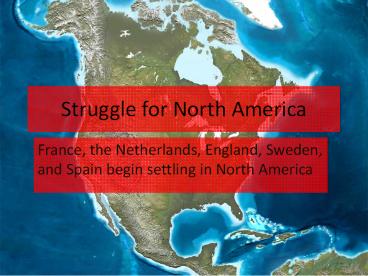Struggle for North America - PowerPoint PPT Presentation
1 / 20
Title:
Struggle for North America
Description:
Struggle for North America France, the Netherlands, England, Sweden, and Spain begin settling in North America A. Expansion of French fishing in North America results ... – PowerPoint PPT presentation
Number of Views:318
Avg rating:3.0/5.0
Title: Struggle for North America
1
Struggle for North America
- France, the Netherlands, England, Sweden, and
Spain begin settling in North America
2
A. Expansion of French fishing in North America
results in France occupying nearly half of North
America
- Explorers and missionaries
- France claims the area of modern-day Canada and
calls it New France - Jacques Cartier explores the coastline of Eastern
Canada and discovers the St. Lawrence River
3
C. Furs, Trapping, and Fishing
- French fur traders travel further inland
- Frances empire eventually reaches from Quebec to
the Great Lakes and down the Mississippi River to
the Gulf of Mexico - However, the French population grew slowly
because of harsh and long winters - High demand led to high prices which enticed
French settlers to focus on fur trading and
fishing
4
D. An Empire Slowly Expands
- 1. French King Louis XVI raised taxes on his
overseas empire to increase revenues
5
II. The 13 English Colonies
- A. John Cabot lands at Newfoundland in 1497 and
claims the area for England
6
B. Establishing the First Colonies
- First permanent English colony is built at
Jamestown, VA in 1607 - First few years were filled with harsh winters,
starvation, and disease - Survivors helped by Native Americans
7
2. English settlers landed at Plymouth, MA in
1620 called themselves Pilgrims
- Came seeking religious freedom
- Signed the Mayflower Compact
- Compact- agreement on rules of governance
8
C. The English Colonies Grow
- A total of 13 colonies established
- Abandon dreams of finding gold and instead used
natural resources - Northern colonies began fishing, logging, and
shipbuilding - Southern colonies develop agriculture, growing
cash crops including rice and tobacco
New Hampshire
Massachusetts
Rhode Island
Connecticut
Pennsylvania
New York
New Jersey
Delaware
Maryland
Virginia
North Carolina
South Carolina
Georgia
9
D. Governing the Colonies
- Unlike Spanish and French colonies, English
settlers had self-governance - Each colony had its own representative assembly
- Assembly was elected settlers (only
property-owning men)
10
III. Struggling for Power
- Conflict arose between Spain, France, England,
and the Netherlands over control over territory
in North America
11
A. Competing for Colonies
- French controlled most of Canada
- Spanish claimed areas of modern-day Texas and
Florida - English and Dutch had colonies along the East
Coast - Native Americans hoped to take advantage of this
conflict by playing European powers against each
other
12
B. Bitter Rivalry Turns to War
- Britain and France battle each other in Europe,
North America, Africa, and Asia in the French and
Indian War - Also called the Seven Years War
13
2. the French and Indian War ends with the Treaty
of Paris in 1763
- France ceded Canada and all its land east of the
Mississippi - Britain gives France its slaving-trading outposts
in Africa and its sugar plantations in the
Caribbean - France keeps in territory in central region of
North America
14
(No Transcript)
15
Key
Color/Pattern Colony European Country
English Colonies
New France
Viceroyalty of New Spain
Brazil
Guiana
16
THE Triangle Trade
17
Triangle Trade
- The Triangle Trade was a series of trade routes
linking Europe, Africa and the Americas.
18
Triangle Trade
- Europeans brought goods to Africa (ex guns,
cloth, cash) - In Africa, merchants traded these goods for
slaves - Slaves were transported to the Americas were they
were traded for sugar, molasses, and other
plantation goods - Merchants shipped American goods back to Europe
(furs, sugar, cotton, molasses, fish, rum) - In England goods were sold or traded for guns,
cloth, cash
19
The Middle Passage
- One leg of the Triangle Trade was the Atlantic
Slave Trade - The Middle Passage refers to journey the slaves
took across the Atlantic
20
What goods were traded in the Triangle Trade?
Rum Tobacco Cotton Molassas
Manufactured Goods
Slaves Gold

















![[PDF] Making It in America: The Almost Impossible Quest to Manufacture in the U.S.A. [PDF] PowerPoint PPT Presentation](https://s3.amazonaws.com/images.powershow.com/10107233.th0.jpg?_=20240824044)













